仁爱英语 九年级上册期末复习
- 格式:doc
- 大小:35.50 KB
- 文档页数:2

仁爱英语九上复习考试要点对于即将面临仁爱英语九上考试的同学们来说,系统而有针对性的复习至关重要。
以下是为大家梳理的仁爱英语九上复习考试要点,希望能助大家一臂之力。
一、词汇词汇是英语学习的基础。
九上的词汇量较大,同学们要熟练掌握课本后面的单词表。
不仅要记住单词的拼写和读音,还要理解其词性、词义和常见搭配。
例如,“achieve”这个单词,意为“实现;达到”,常见搭配有“achieve one's dream”(实现某人的梦想)。
同时,要注意一些容易混淆的单词,如“alone”和“lonely”。
“alone”表示“独自的,单独的”,侧重于客观上的一个人;“lonely”则表示“孤独的,寂寞的”,侧重于主观上的感受。
建议同学们采用多种方法来记忆单词,如制作单词卡片、通过阅读和写作来巩固、运用联想和记忆技巧等。
二、语法1、宾语从句宾语从句是九上的重点语法之一。
要掌握宾语从句的引导词(如that, if/whether, 特殊疑问词等)、语序(要用陈述句语序)和时态(要根据主句的时态来确定从句的时态)。
例如:“He says that he is astudent” (主句是一般现在时,从句根据实际情况用相应时态);“She asked if I had finished my homework” (主句是一般过去时,从句要用相应的过去时态)。
2、定语从句这也是一个重要的语法点。
要了解定语从句的关系代词(that, which, who, whom, whose)和关系副词(when, where, why)的用法,以及先行词在从句中的作用。
比如:“The man who is talking to myfather is a teacher” (先行词“the man”在从句中作主语,用关系代词“who”)。
3、现在完成时现在完成时表示过去发生的动作对现在造成的影响或结果,或者过去开始一直持续到现在的动作。
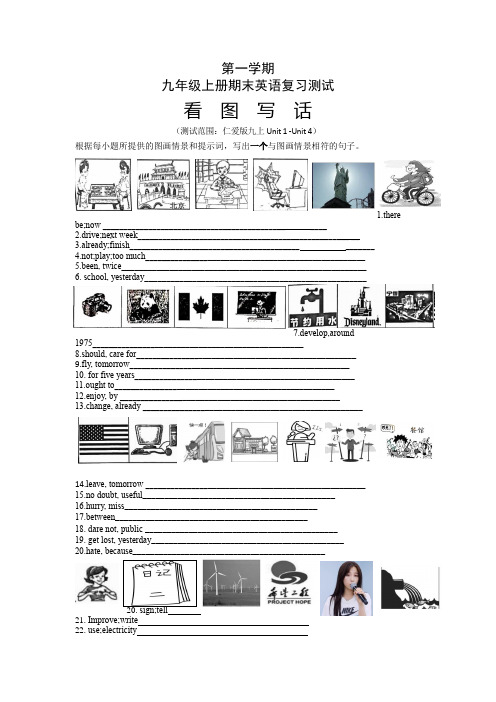
第一学期九年级上册期末英语复习测试看图写话(测试范围:仁爱版九上Unit 1 -Unit 4)根据每小题所提供的图画情景和提示词,写出一个与图画情景相符的句子。
1.there be;now____________________________________________ ____2.drive;next week___________________________________________________ __3.already;finish_________________________________________ _______4.not;play;too much___________________________________________________5.been, twice________________________________________________________6. school, yesterday___________________________________________________7.develop,around1975_________________________________________________8.should, care for___________________________________________________9.fly, tomorrow___________________________________________________10. for five years___________________________________________________11.ought to___________________________________________________12.enjoy, by ___________________________________________________13.change, already___________________________________________________14.leave, tomorrow ___________________________________________________15.no doubt, useful____________________________________________16.hurry, miss____________________________________________17.between____________________________________________18. dare not, public ____________________________________________19. get lost, yesterday____________________________________________20.hate, because____________________________________________20.sign;tell21.Improve;writee;electricity23.provide;education24.Yu Shuxin;known25.pour…into;cause26.recycle;protect27.contribution;education28.improve;listen29.Donald Duck;favourite30.look;meaning31.about;the film33.harmful; reach;directly34.ask35.as a sign of36.keep in touch37.have38.better;cloth39.regard;symbol40.have already41.Do not英语试题参考答案及评分标准看图写话(每小题2分)(评分建议:只要考生按图示和指示词写出意思完整,语法正确的句子即可得分,所给提示词必须用上。
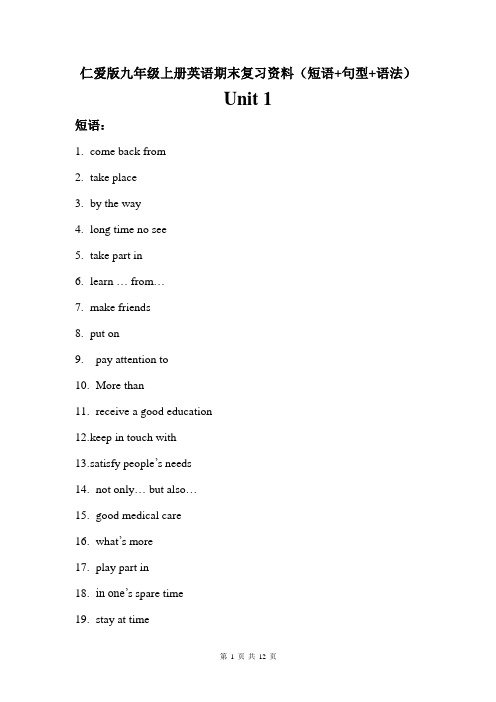
仁爱版九年级上册英语期末复习资料(短语+句型+语法)Unit 1短语:e back from2.take place3.by the way4.long time no see5.take part in6.learn … from…7.make friends8.put on9.pay attention to10.More than11.receive a good education12.k eep in touch with13.s atisfy people’s needs14.not only… but also…15.good medical care16.what’s more17.play part in18.in one’s spare time19.stay at time21.increase by22.increase to23.c arry out24.at the same time25.for example26.so far27.be known as28.deal with29.be surrounded byed to31.get used to32.as a matter of factlions of34.stand for35.manage to do sth.36.decide to do sth37.decide on38.offer sb, help39.provide sb. with sth.40.so… that…41.so that43.thanks to44.pick up45.in need46.around the world47.be able to48.on purpose49.think of… as…50.make contributions to51.as a result52.with/without the help of53.be short of54.plenty of55.all kinds of56.as well as57.succeed in doing sth58.make progress59.according to60.take measures to do sth61. places of interest62. long history句型:1. Great changes have taken place there.2. There goes the bell3. I have been to Cuba to be a volunteer.4. She has gone to the library, let’s go and find her.5. I haven’t seen you for a long time.6. What a wonderful experience!7. The population in developing countries is growing faster.8. What’s the population of the China?语法:1.现在完成时:have/ has + 过去分词(1)表示过去发生或者已经完成的动作对现在造成的影响。
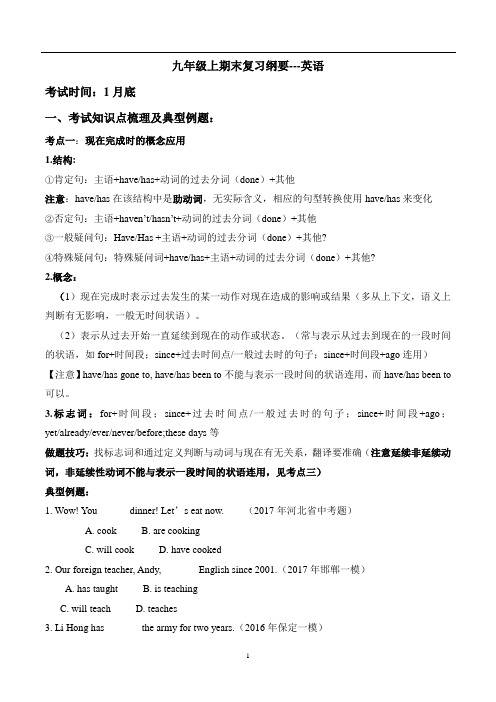
九年级上期末复习纲要---英语考试时间:1月底一、考试知识点梳理及典型例题:考点一:现在完成时的概念应用1.结构:①肯定句:主语+have/has+动词的过去分词(done)+其他注意:have/has在该结构中是助动词,无实际含义,相应的句型转换使用have/has来变化②否定句:主语+haven’t/hasn’t+动词的过去分词(done)+其他③一般疑问句:Have/Has +主语+动词的过去分词(done)+其他?④特殊疑问句:特殊疑问词+have/has+主语+动词的过去分词(done)+其他?2.概念:(1)现在完成时表示过去发生的某一动作对现在造成的影响或结果(多从上下文,语义上判断有无影响,一般无时间状语)。
(2)表示从过去开始一直延续到现在的动作或状态。
(常与表示从过去到现在的一段时间的状语,如for+时间段;since+过去时间点/一般过去时的句子;since+时间段+ago连用)【注意】have/has gone to, have/has been to不能与表示一段时间的状语连用,而have/has been to 可以。
3.标志词:for+时间段;since+过去时间点/一般过去时的句子;since+时间段+ago;yet/already/ever/never/before;these days等做题技巧:找标志词和通过定义判断与动词与现在有无关系,翻译要准确(注意延续非延续动词,非延续性动词不能与表示一段时间的状语连用,见考点三)典型例题:1. Wow! You ______dinner! Let’s eat now. (2017年河北省中考题)A. cookB. are cookingC. will cookD. have cooked2. Our foreign teacher, Andy, _______English since 2001.(2017年邯郸一模)A. has taughtB. is teachingC. will teachD. teaches3. Li Hong has_______ the army for two years.(2016年保定一模)A. joinedB. be inC. been inD. joined in考点二::before, just, never, ever, already, yet 常用于现在完成时,用法如下: 注意:still“仍,还”;still 不用于现在完成时中。
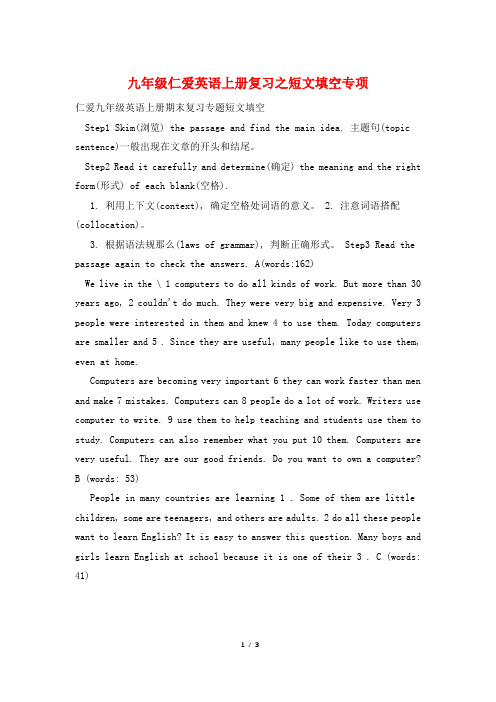
九年级仁爱英语上册复习之短文填空专项仁爱九年级英语上册期末复习专题短文填空Step1 Skim(浏览) the passage and find the main idea. 主题句(topic sentence)一般出现在文章的开头和结尾。
Step2 Read it carefully and determine(确定) the meaning and the right form(形式) of each blank(空格).1. 利用上下文(context), 确定空格处词语的意义。
2. 注意词语搭配(collocation)。
3. 根据语法规那么(laws of grammar), 判断正确形式。
Step3 Read the passage again to check the answers. A(words:162)We live in the \ 1 computers to do all kinds of work. But more than 30 years ago, 2 couldn't do much. They were very big and expensive. Very 3 people were interested in them and knew 4 to use them. Today computers are smaller and 5 . Since they are useful, many people like to use them, even at home.Computers are becoming very important 6 they can work faster than men and make 7 mistakes. Computers can 8 people do a lot of work. Writers use computer to write. 9 use them to help teaching and students use them to study. Computers can also remember what you put 10 them. Computers are very useful. They are our good friends. Do you want to own a computer?B (words: 53)People in many countries are learning 1 . Some of them are little children, some are teenagers, and others are adults. 2 do all these people want to learn English? It is easy to answer this question. Many boys and girls learn English at school because it is one of their 3 . C (words: 41)1 school many things happen2 us. We may feel excited when we have success3 a school play. We may feel sorry if we lose an important game. We want to keep the memory for the rest4 our lives.D (words: 61)Last summer, 15-year-old Bob 1 a problem. Like a lot of children, Bob2 interested in doing many things. He3 dancing most and wanted to joina dancing group. But Bob’s high school 4 have a boys’ dancing group but a girls’ group. He tried to join the girls’ group. But he wasn’t 5 to stay in the girls’ group. E (words: 75)Once there was a little boy. He got angry 1 . His father gave him some nails([neil]钉子) and told him: “When you get 2 , put a nail into the wall.〞 On the first day, the boy put 37 nails into the wall. The next day, he put in 3 nails. A few days later, he found it much 4 not to get angry. After a month, the boy was happy every day. F (words: 84)Do you still remember the girl withbig eyes? The 1 big eyes are telling us her dream: I wish to go to school! In China, there are still lots of girls and 2 like her. They want to go to school, but their 3 are too poor. If the family has two or three 4 , it is harder to pay the money for all of them. So the 5 often ask girls to stay at home, and boys to go to school. G (words: 90)People’s inventions are clever, but 1 can be dangerous, too . For example, people invented factories, and now they make river dirty. 2 can make many changes. Dirty rivers kill fish. Then bears cannot eat the fish and the bears die. If 3 kill one part of the food chain, the other parts also die. Remember that we are a part of the food chain, so we are in danger too! If we protect animals, we are protecting 4 ! We should and we could do 5 for the world! H (words:213)〔09〕About three years old, I felt very lonely. I didn’t like my classmates, my parents or anyone else. My classmates didn’t want to talk ___1____me and my parents were always saying that other kids were better than me.I thought I was the ___2___ unlucky person in the world.One day I had a big fight with one of my classmates. I was so angry __3__ I hit him in the face. Just at that moment, a boy stood up and____4____ the fight. He was the monitor of our class.After that, he often helped me and we became good ___5____. Whenever I got angry or sad, he would help __6___ to cool down. My life began to change because of the boy, my best friend. We spent a lot of interesting days together. As ___7___ goes by, I have become happier with people and things. And it ___8____ that people around me have changed, too. My parents don’t shout at me ___9____ more and my classmates become friendly to me. But now I can’t see my best friend because he is seriously ___10___ and is staying in hospital. How I miss the days when we were together!I hope he will be all right and come back to school soon.。
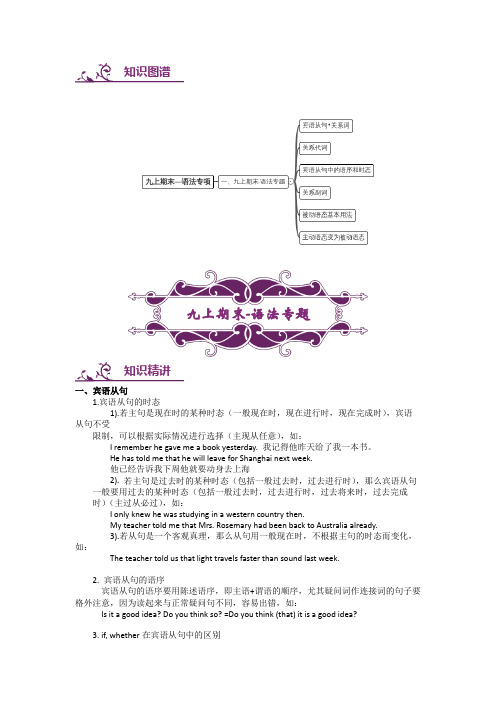
知识图谱九上期末-语法专题知识精讲一、宾语从句1.宾语从句的时态1).若主句是现在时的某种时态(一般现在时,现在进行时,现在完成时),宾语从句不受限制,可以根据实际情况进行选择(主现从任意),如:I remember he gave me a book yesterday. 我记得他昨天给了我一本书。
He has told me that he will leave for Shanghai next week.他已经告诉我下周他就要动身去上海2). 若主句是过去时的某种时态(包括一般过去时,过去进行时),那么宾语从句一般要用过去的某种时态(包括一般过去时,过去进行时,过去将来时,过去完成时)(主过从必过),如:I only knew he was studying in a western country then.My teacher told me that Mrs. Rosemary had been back to Australia already.3).若从句是一个客观真理,那么从句用一般现在时,不根据主句的时态而变化,如:The teacher told us that light travels faster than sound last week.2. 宾语从句的语序宾语从句的语序要用陈述语序,即主语+谓语的顺序,尤其疑问词作连接词的句子要格外注意,因为读起来与正常疑问句不同,容易出错,如:Is it a good idea? Do you think so? =Do you think (that) it is a good idea?3. if, whether在宾语从句中的区别在宾语从句中if和whether都是“是否”的意思,但在以下情况下,只能用whether1). if和whether表作“是否”时,介词后一般不用if,如:They are talking about whether she will come tonight. 他们正在讨论今晚她会不会来。
初三上学期期末考试复习提纲(二)Unit 2 Topics 1 — 3Topic 1Grammer: Direct Speech and Indirect Speech直接引语间接引语直接引用或复述别人的话,被引用部分称为直接引语;用自己的话转述别人的话,被转述部分叫间接引语。
直接引语改为间接引语要注意以下几点变化:1.时态变2.指示代词地点状语和动词变3.人称变He said to us,”I will show you around the Great Wall tomorrow.”(变间接引语)He told us that he would show us around the Great Wall the next day.4.语序变①直接引语为陈述句,变成that引导的宾语从句,that可省。
He of ten says (that) China is great.→He often says(that)China is great.②直接引语为一般疑问句,一般变成以whether或if引导的宾语从句,用陈述句语序。
He says,”Is Tom an Englishman?”→He asks whether/if Tom is an Englishman.③陈直接引语为特殊疑问句,疑问词变为连接词,语序改为陈述句语序,问号变句号。
He asked,”Where is she going?”→He asked where she was going.5.祈使句改为间接引语:一改二变三加四去一改:said (to)改为told或asked /ordered二变:said to的宾语变为told /asked/ ordered等的宾语三加:在动词原形前加to或not to四去:去掉pleaseHe said to her,”Don’t take the book away,please.”→He asked her not to take the book away.Topic 2Grammer:Indef inite Pronouns不定代词不指明替代任何特定名词或形容词的代词叫做不定代词,在句中可做主语、表语和宾语。
Unit 1Topic 1重点短语1. feel sorry for …对……深表同情2 . learn …from从… …当中学习3 . in the past/ future在过去/ 在将来4 . in detail 详细地5 . have no chance to do sth. 没有机会做某事6 . afford ( to do) sth 担负得起(做)某事7. give support to sb. 给某人帮助/支持8 . with the development of …随着… …的发展9 . sleep in the open air 在户外睡觉1 0used to do sth. 过去常做某事1 1fall ill得病/ 患病12divide •…into •…把……分成……13. thanks to多亏; 幸亏;由于14. with the help of …在… …的帮助下重点句型1. Parentscouldn 't afforedducation for their children. 父母供不起孩子上学。
afford 常与can,could 或be able to 连用,尤其用于否定句或疑问句,表“负担得起(做)某事;抽得出(时间) ”“(can't/ couldn 't) afford (to do) sth.2. Our government gives support to poor families. 我们的政府能为贫困家庭提供帮助。
give support to sb.= give sb. support 为某人提供帮助/ 支持support作动词时表供养;支持;支撑”3. Why not go and search the Internet for some information? 为什么不上网查找相关信息呢?search sp. for sth. 搜查某地寻找某物search sb. for sth. 搜身查找某物search for sth./ sb.= look for sth./ sb. 搜寻某物/ 某人;4. One part was used to help support my family, to help send my elder brother to school.一部分钱用来供养全家人,另一部分用来供哥哥上学.a) one part …the other (part) 一部分 ...... 另一部分 ..... b) elder brother 哥哥elder 作形容词时 , 是 old 的比较级 , 一般表示家庭成员出生的顺序 ,在 句中只能作定语 ,可与 than 连用 ; 而 older 表年龄的比较 ,可与 than 连用.5. sth. h appe n to sb.某人发生了某事三、重点语法(一)现在完成时: 表示过去已经发生或已经完成的某一动作对现在造成的影响 或结果。
仁爱九年级上册短语一、短语Unit 1 Topic 1短语e back from从…. 回来2. be happy to do sth.很高兴干某事3.take place发生4.by the way 顺便问一下5.take photos 照相6.so… that如此… 以至于7.too…to do…太… 而不能干…8.not +adj.+enough to do sth.不足够…能干….9.for a long time 长时间10.have/has been to曾经去过某地,回来了11.have/has gone to去某地了,还没有回来12.have/has been in/at一直在某地13.take part in=join in参加某种活动14.join参加某种组织15.in a disabled children’s home在残疾儿童之家16.learn…from…向…学习17.have no time to do sth.没时间干…18.put on上映,穿上19.more than=over多于20.in the 1960s在二十世纪六十年代21.the living conditions生活条件22.be crowded with挤满…23.have the chance to do 有机会干…24.the reform and opening-up改革开放25.not only…but also 不但… 而且26.in order to do=so as to do… in order that…=so that..为了干某事27.keep in touch with 与… 保持联系28.see sth. oneself 亲眼目睹…29.far away 遥远的30.receive a good education受到好的教育31.all sorts/kinds of 各种各样的32.succeed in doing sth.=be successful in doing sth. 成功做某事33.dream about/of doing sth.梦想干某事34.thanks to 多亏35.make great/rapid progress 取得巨大的进展36.make progress in doing sth.在干某事方面取得进展37.play a part/role in….在…中起作用38.hide-and-seek捉迷藏39.in one’s spa re/free time在某人的闲余时间40.play cards打扑克41.places of interest名胜42.in the past在过去Unit 1 Topic 2短语1.get/be lost 迷路2.each other 互相3.call/ring sb. up 打电话给某人4.go shopping 购物5.at least/at most至少/至多6.too many/much太多…7.have a population of有…人口8.increase to增加到9.increase by增加了10.developing/ developed country发展中国家/发达国家11.because of 因为;由于12.be strict with sb/ in sth.对某人/某物要求严格13.carry out 执行14.supply sth. to sb.=supply sb. With sth.给某人提供某物15.provide sth. for sb.=provide sb. With sth.给某人提供某物16.offer sth. to sb.=offer sb. Sth.给某人提供某物17.be short of…缺少…18.so far=up to now 到目前为止19.take measures to do sth. 采取措施干某事20.have fun doing 开心干某事21.offer a good education 提供一个良好的教育22.work well in doing sth. 干..有成效23.be known/famous as作为…而闻名24.be known/famous for由于...而闻名25.for example/instance例如26.have a long way to go 有很长的路要走27.20 percent百分之二十28.called=named=with the name of…名字叫…29.be surrounded by/with被…环绕30.live close to nature亲近自然31.be careful with…小心….32.discourage doing sth.阻止干…33.belong to 属于…34.分数=分子/分母=基数词/序数词35.2/3=two thirds36.have difficulty/ trouble in doing sth.干某事有困难Unit 1 Topic 3短语1.be/get used to doing… 习惯于干…ed to do sth.过去常常干某事3.as a matter of fact =in fact 事实上e for a visit来参观5.stand for代表6.show sb. Sth.=show sth. to sb.给某人出示某物7.hundreds of数百计8.break out 爆发9.in need 在困难时10.decide on doing sth.=decide to do sth.=make a decisionto do sth. 决定干某事11.feel good about oneself 自我感觉良好12.live a normal life 过着正常的生活13.according to… 根据…14.be away from … 远离…15.help sb. out帮助某人走出困境16.around/all over /throughout/the world全世界17.have a problem with…方面有问题18.have a mental illness有精神疾病19.on purpose故意的20.have an effect/influence on…对…有影响21.raise the children抚养孩子22.steal sth. from sb.偷某人东西23.give support to sb.给某人提供帮助24.think of…as…把…当作25.afford an education支付起教育26.raise money捐钱27.make a contribution to为…做贡献28.encourage sb. to do sth.鼓励某人干某事29.moral development德育发展30.modern thinking现代意识31.at the same time 同时32.take drugs 吸毒33.obey/break the rules遵守违反规则34.at home and abroad 国内外35.in the past/last few years 在过去的几年中36.pay… for 为… 付款Unit 2 Topic 1短语1.There be+sb./sth doing ..,有某人/某物在干什么2.have a picnic 野餐3.pour…into…把…倒入…里面4.cut down砍倒5.have/get a pain in… .. .疼痛6.can’t bear/stand doing sth.不能忍受干某事7.be harmful to…=do harm to… 对……是有害的8.in a bad mood 处于坏情绪9.the dead fish死鱼10.you’d better do…你最好干…11.everywhere=here and there到处12.not all并非所有的….13.humans’ health人类的健康14.in noisy conditions在嘈杂状况下15.lose one’s hearing丧失某人的听力16.hearing loss听力丧失17.It’s reported that…据报道说18.It’s said that…据说19.It’s believed that…据相信20.It’s known that…众所周知21.manage to do sth 设法做某事22.at midnight 在午夜23.go deaf 变聋24.quite a few =many 相当多25.no better than 与…一样(差、坏)26.in public 在公共场所27.two days later 两天后Unit 2 Topic 2短语1.as a result结果2.change/turn into...变成…3.blow away吹走4.wash away冲走5.take away带走6.human beings=mans=humans人类7.protect the environment保护环境8.die out灭绝9.the importance of…的重要性10.something useful有用的东西11.walk on grass 践踏草坪12.care for=look after=take care of 关心;照顾13.make rules to do制定规则干某事14.pick flowers 摘花15.give some advice/suggestions to … 给……一些建议16.in the beginning =at first=to begin with=to start with 在开端17.do/try one’s best to do sth.尽力干…18.be good/bad for…对…有好/坏处19.prevent/stop/keep sb from doing sth 阻止某人做某事20.be important to…对….很重要21.escap e…from….从…逃跑22.avoid doing sth.避免干…23.save water节约用水24.be covered with…被…覆盖25.in danger of 处于……的危险中26.day by day 一天天e into being 形成28.cut off 切断29.pass through 通过;穿过30.be helpful to 对……有帮助31.refer to 指的是…涉及…32.deal with 处理33.at the same time 同时34.take up 占据Unit 2 Topic 3短语1.interview sb. about sth. 采访某人某事2.spread the message 传递信息3.encourage sb. to do sth. 鼓励某人做某事4.both sides of paper双面纸5.save money 省钱6.save energy节约能源7.Easier said than done.说着容易做着难。
一、“现在完成时
1、概念:现在完成时表示过去已发生或已完成的某个动作对现在造成的影响或结果,或者动作或状态从
过去延续到现在,与现在有关。
2. 结构:have / has + 动词过去分词
3. already, 通常用于陈述句中(放在have和has的后面,或句子末尾)
never,用于否定句译为“从不”(放在have和has的后面)
ever, 用于疑问句或者陈述句译为“曾经”(放在have和has的后面)
Have you ever been to Beijing?
just,只用于陈述句意思是“刚才”(放在have和has的后面)
I have just received a letter.
yet :①yet可用于否定句,此时译为“还”;
I haven’t found my ruler yet.
②也可以用于疑问句,译为“已经”(放在have和has的后面也可放在句末)
Have you found your ruler yet?你已经找到尺子了吗?
4. for 和since
5. 延续性和短暂性动词(背诵课文p119)
练习:
( )1. —Where have you _____ these days?
—I have _____ to Kunming with my friends.
A been , gone
B been , been
C gone , been
D gone, gone
( )2. How long have you ____ this book?
A. bought
B. borrowed
C. had
D. lent
( )3. —Excuse me, ____ you seen the film yet?
—Yes, I _____ it last night.
A have, see
B have, have seen
C have, seen
D have, saw
( )4. He has never ridden a horse before,_____?
A. is he
B. isn’t he
C. hasn’t he
D. has he
( )5..My brother has ___ the army for five years. He uses most of his spare time to learn maths.
A. joined in
B. joined C been to D. been in
( )6.. Mr. Green ____ in China since five years ago.
A lived
B has lived
C lives
D is going to live
( )7.He moved here in 1999,and he has been here .
(A)at that time (B)for five years ago(C)since four years (D)for four years
( )8.Tom has been away from home about five days ago.
(A)\ (B)in (C)since (D)for
( )9.She has__________ to Beijing twice .
(A)gone (B) got (C)been (D)come
( )10 .——where your father , Li Lei?
——To Beijing
(A)have,been (B)has,been (C)have,gone (D)has,gone
二、直接引语和间接引语
1. The pupil asked his teacher _____ round the earth.
A. weather the moon goes
B. that the moon went
C. whether the moon goes
D. whether the moon went
2.She asked him ____.
A. whose dictionary this is
B. whose dictionary that was
C. whose dictionary is this
D. whose dictionary that is
3.Mary’s mother asked her _____.
A. that whether she had finished her homework
B. if she has finished her homework
C. if she had finished her homework
D. that if she had finished her homework
4. Do you know ____?
A. what is he doing
B. what he doing
C. what he is doing
D. what does he do now
5. I don’t know ____ to learn English.
A. when did he begin
B. when he began
C. he when began
D. when he begins
6. He asked me ____.
A. how would the weather be like tomorrow
B. what the weather would be like the next day
C. how the weather would be like tomorrow
D. what would the weather be like the next day
7.I wonder how much _____.
A. does he spend on his car
B. did he spend on his car
C. he spent on his car
D. he spent in his car
8.Our teacher asked us _____ our dictionaries to school.
A. bring
B. brought
C. bring
D. to bring
9. The teacher told the boy students ______ football on the grass.
A. not play
B. not to play
C. played
D. playing
三、被动语态
be + Vp.p(动词的过去分词)
一般现在时am/ is / are + V(过去分词)
一般过去时was/ were+ V(过去分词)
将来时will be + V(过去分词)
含有情态动词情态动词+ be + V (过去分词)
1.English _____ in many countries, but Chinese _____ their own languages.
A.is spoken,speaks
B.speaks,is spoken
C.is spoken,speaken
D.is spoken,is spoken
2.hese young trees must ______ after well.
A.look
B.looks after
C.be looked
D.looked
3.Keys are used for _____ doors.
A.lock
B.locked
C.locking
D.locks
4. A big cinema ______ in our town next year.
A.will build
B.is built
C.will be built
D.has built
5.This book _____ by a famous writer many years ago.
A. writes
B. is written
C. was writen
D. was written
6.They built a new school in the village last year.(改为被动语态)
A new school ___________ ___________ in the village last year.
7.In the old days people used teapots(茶壶)to make tea. (改为被动语态)
In the old days teapots ___________ ___________ to make tea.
8.This makes me feel thirsty.(改为被动语态)
I __________ __________ __________ feel thirsty by this.
9.Did you buy this bike from the shop ? (改为被动语态)
__________ __________ __________ __________ from the shop (by you)?。